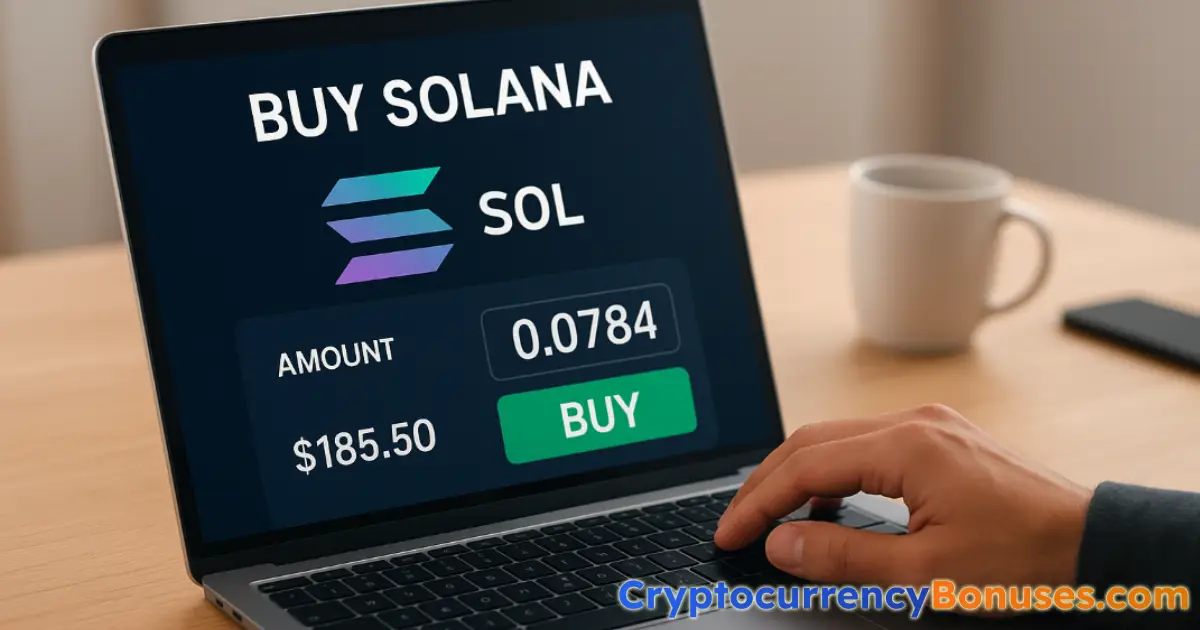Introduction: Why Buy Solana?
Solana (SOL) has quickly emerged as one of the fastest-growing blockchain networks, praised for its lightning-fast transactions, low fees, and scalability. While Bitcoin and Ethereum dominate the market, Solana is carving its place as the go-to network for DeFi projects, NFT marketplaces, and Web3 applications.
If you’re wondering how to buy Solana today, this guide will walk you step by step through the process — from choosing a reliable exchange to securing your tokens in a wallet. Whether you’re new to crypto or already trading, this article will help you make an informed decision.
What is Solana and Why Does It Matter?
Brief History of Solana
Launched in 2020 by Anatoly Yakovenko, Solana was designed to solve blockchain’s “trilemma”: scalability, security, and decentralization. Unlike older blockchains, Solana uses a unique mechanism called Proof of History (PoH) combined with Proof of Stake (PoS), allowing it to process up to 65,000 transactions per second.
Key Features That Make Solana Unique
- High throughput: Lightning-fast transaction speeds.
- Low fees: Transactions cost fractions of a cent.
- Developer-friendly: Strong ecosystem for dApps, DeFi, and NFTs.
- Growing adoption: Projects like Magic Eden, Serum, and Audius are built on Solana.
SOL Use Cases in the Ecosystem
- Paying transaction fees on the Solana blockchain.
- Participating in NFT marketplaces like Magic Eden and Solanart.
- Earning rewards through staking SOL.
- Using SOL in DeFi applications for trading, lending, and liquidity provision.
Things to Know Before Buying Solana
Speed and Scalability Advantages
Solana is often called the Ethereum killer because it solves many of Ethereum’s limitations, such as high gas fees and slower transaction times.
Risks and Volatility
Like all cryptocurrencies, SOL’s price is volatile. It has seen dramatic rises and steep drops, so invest only what you can afford to lose.
Regulation and Adoption
While Solana is legal in most countries, regulations differ. Be prepared for KYC verification when using major exchanges.
Step-by-Step Guide: How to Buy Solana Today
Step 1: Select a Reliable Exchange or Broker
Some of the best platforms include:
Centralized Exchanges
- Binance – Low trading fees, wide availability.
- Coinbase – Beginner-friendly and secure.
- Kraken – Great for both beginners and professionals.
Decentralized Options
- Raydium – A popular Solana-based DEX.
- Orca – User-friendly interface for swapping SOL tokens.
Step 2: Create a Solana Wallet
Never store large amounts of SOL on an exchange. Use one of these trusted wallets:
- Phantom Wallet – Browser extension, ideal for NFTs and DeFi. Read also: Phantom Wallet Tutorial, complete guide for beginners.
- Solflare Wallet – Works across mobile and desktop.
- Ledger Nano X – A hardware wallet for maximum security.
Step 3: Fund Your Account
Deposit funds via:
- Bank transfer
- Debit/credit card
- PayPal (on selected platforms)
Step 4: Buy SOL with Market or Limit Order
- Market order: Buy instantly at the current price.
- Limit order: Buy at a specific price when SOL reaches your target.
Step 5: Transfer and Secure SOL
Once purchased, transfer your SOL into a private wallet. This ensures you’re in full control of your funds.
Best Platforms to Buy Solana in 2025
- Best for beginners: Coinbase, Kraken
- Best for low fees: Binance, KuCoin
- Best for mobile traders: Crypto.com, eToro
- Best for DeFi: Raydium, Orca
Tips for First-Time Solana Buyers
- Understand staking: Staking SOL can earn you passive rewards of 5–7% annually.
- Diversify: Don’t put all your money into one coin. Spread across multiple projects.
- Start small: Begin with a small amount before making bigger investments.
Common Mistakes to Avoid with Solana
- Keeping SOL only on exchanges: Always move funds to a secure wallet.
- Ignoring transaction fees on DEXs: While low, they still add up.
- Falling for pump-and-dump schemes: Avoid hype-driven buys.
Alternative Ways to Acquire Solana
- Staking Rewards: Earn SOL by delegating tokens in a wallet.
- DeFi Opportunities: Provide liquidity on Solana DEXs and earn fees.
- NFT Marketplaces: Some NFT projects reward users in SOL tokens.
Tax Considerations for Solana Buyers
- U.S. investors: SOL is taxed as property, so gains are subject to capital gains tax.
- European investors: Rules vary by country but require reporting.
- Use crypto tax tools like Koinly or CoinTracking to stay compliant.
Future of Solana: Should You Buy Now?
Solana has positioned itself as a serious competitor to Ethereum. Its high-speed network, thriving NFT scene, and growing DeFi adoption make it one of the strongest blockchains.
With institutional interest rising and continuous improvements to network stability, Solana could play a major role in scaling Web3. If you believe in a future with decentralized finance and NFTs, buying SOL now may be a smart move.
Your Next Step in Buying SOL
Buying Solana in 2025 is easier than ever. With its fast network, low costs, and rapidly expanding ecosystem, SOL has become a must-have cryptocurrency for both beginners and advanced traders.
To recap:
- Use a trusted exchange like Coinbase, Binance, or Kraken.
- Always secure your SOL in a wallet.
- Explore staking and DeFi opportunities to maximize returns.
Ready to buy Solana? Visit cryptocurrencybonuses.com to find the best platforms and exclusive bonuses for SOL buyers today.
